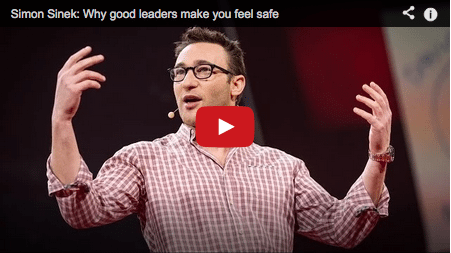5 Employee Engagement TED Talks that Every Entrepreneur Must Watch
The Ted Talk has become this generation’s quick answer to gaining more knowledge on any subject. What entrepreneur wants to read 272 pages on how to motivate employees when you can spend eighteen and a half minutes hearing Daniel Pink speak about it?
Sit back, put on your headphones and enjoy. If your boss walks by and asks what you’re doing, say that you are working on your leadership skills and increasing your employee engagement and productivity.
1. Simon Sinek: Why Good Leaders Make You Feel Safe
In 2009, Simon Sinek gave a Ted Talk entitled “How Great Leaders Inspire Action”. The talk went viral, and inspired thousands of leaders to discover their “why” – the belief that motivates their actions and the actions of those who follow them.
Simon is back with a new talk based on his book, Leaders Eat Last. He recognizes that “in the military they give medals to people who are willing to sacrifice themselves so that others may gain. In business we give bonuses to people who are willing to sacrifice others so that we may gain.” Why do we have it backwards?
The difference is the environment. Some leaders develop environments of safety, trust and cooperation, where they put others first. Those leaders develop workplaces where employees feel secure to be their most creative and productive selves.
2. David Logan: Tribal Leadership
Tribes are naturally occurring groups of humans, and your organization functions primarily at one of these tribal stages:
Stage 1: Life Sucks. This is the culture of despairing hostility found in gangs and prisons.
Stage 2: My Life Sucks. This culture makes people dumb (think about your local DMV).
Stage 3: I’m Great…And You’re Not. Most organizations have this type of competitive, political environment.
Stage 4: We’re Great! This tribe is aware of its own existence and accomplishes great things together.
Stage 5: Life Is Great! We are oriented only by our collective values and we change the world.
What stage is your company culture? How will you nudge people to the next level?
3. Dan Ariely: What Makes Us Feel Good About Our Work?
Behavioral economist Dan Ariely explains that motivation is not just based on satisfaction or financial gain. We like to feel connected to a greater purpose, and desire ownership and pride in our work.
The link between a person’s ownership over a task and their engagement, is a fundamental human need that goes beyond workplace dynamics. For example, when cake mixes first came out in the 1940s, they didn’t sell. Why? It was too easy. People did not feel right baking a cake from a “just add water” mix, and presenting it as their own. It turns out that if you have to beat an egg, measure some milk and melt some butter, you feel enough ownership in the finished product to buy the Betty Crocker cake mix from the supermarket.
The lesson for managers and executives is that employee engagement is fueled by both challenge and ownership. We imprint ourselves on a project when we spend time absorbing it, considering our options, and finally implementing a solution. When a task is too easy, we don’t feel like it is ours and we don’t fully engage with it.
4. Brene Brown: The Power of Vulnerability
Dr. Brené Brown is a research professor at the University of Houston and the author of several books including Daring Greatly, where she encourages others to be vulnerable. After reading thousands of stories in her decade-long research study to deconstruct shame and vulnerability, she discovered 2 common threads:
1) “Connection is why we’re here. It’s what gives purpose and meaning to our lives”.
2) Shame is the fear of disconnection. People are not vulnerable because they think, “is there something about me, that if other people hear it or see it, that I won’t be worthy of connection?”
There are two groups of people, those who have a sense of belonging and people who always wonder if they are good enough. The courageous ones feel worthy and desire to tell the story of who they are with their whole heart. The courage to be imperfect is what allows people to face their demons, to be vulnerable, and to grow into better versions of themselves.
5. Mihaly Csikszentmihaly: Flow – The Secret To Happiness
In this talk based on his book Flow, Mihaly Csikszentmihaly shares his research stories about artists, athletes, and others who experience a state of deep ecstatic focus on their tasks. Perhaps you have experienced this ecstasy and looked up to see that you had worked for hours, when it felt like only minutes had passed.
The trick for entering a flow state was beautifully expressed by Norman Augustine, former CEO of Lockheed Martin:
“You have to enjoy what you are doing. You won’t be very good if you don’t. And secondly, you have to feel that you are contributing something worthwhile…If either of these ingredients are absent, there’s probably some lack of meaning in your work.”
David Mizne is Content Manager at 15Five, the leading web-based employee feedback and alignment solution that is transforming the way employees and managers communicate. David interviews some of the most brilliant minds in business and reports on topics ranging from entrepreneurship to employee engagement.



